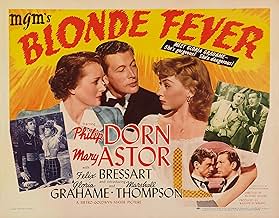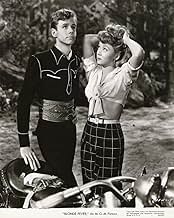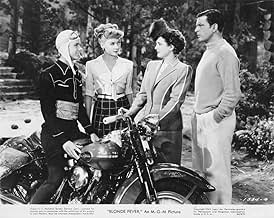AVALIAÇÃO DA IMDb
5,4/10
484
SUA AVALIAÇÃO
Adicionar um enredo no seu idiomaPeter owns a small but upscale café on the road between Reno and Lake Tahoe in Nevada. He is a heavy gambler and his marriage is rocky. Into is life come a waitress named Sally.Peter owns a small but upscale café on the road between Reno and Lake Tahoe in Nevada. He is a heavy gambler and his marriage is rocky. Into is life come a waitress named Sally.Peter owns a small but upscale café on the road between Reno and Lake Tahoe in Nevada. He is a heavy gambler and his marriage is rocky. Into is life come a waitress named Sally.
- Direção
- Roteiristas
- Artistas
Carlyle Blackwell Jr.
- Quartet Leader
- (não creditado)
Hume Cronyn
- Diner at Inn
- (não creditado)
Ava Gardner
- Minor Role
- (não creditado)
Sherry Hall
- Second Waiter
- (não creditado)
Sam Harris
- Diner at Inn
- (não creditado)
Edward Kilroy
- First Waiter
- (não creditado)
Dagmar Oakland
- Minor Role
- (não creditado)
John Phipps
- Cab Driver
- (não creditado)
Paul Scott
- Mr. Alexander
- (não creditado)
- Direção
- Roteiristas
- Elenco e equipe completos
- Produção, bilheteria e muito mais no IMDbPro
Avaliações em destaque
Philip Dorn and Mary Astor are a couple running a pricey roadhouse. Marshall Thompson and Gloria Grahame (in her screen debut) work for them and hope to get married. Then Dorn wins $40,000 in a sweepstakes, develops a passion for Miss Grahame, and she for him.
On paper it looks like a good set-up, with credited writers like Ferenc Molnar and George Oppenheimer. On the screen, alas, it works only intermittently, when Felix Bressart is speaking as the mlld-mannered bartender, and there are occasional sparks of witty dialogue between Dorn and Miss Astor. Otherwise, it's another Code-compliant, sexless sex comedy, with most of its budget spent pre-production, musical cues are lifted from the Andy Hardy series, and the main pleasure is playing spot-the-players in the crowd. Yes, that's Elisabeth Risdon on a motorcycle on the start. Yes, that's Hume Cronyn and Jessica Tandy at a table. It's not that there are any issues with the production. It's that there's no real issue in the movie, and we know from the beginning that everything will turn out all right.
On paper it looks like a good set-up, with credited writers like Ferenc Molnar and George Oppenheimer. On the screen, alas, it works only intermittently, when Felix Bressart is speaking as the mlld-mannered bartender, and there are occasional sparks of witty dialogue between Dorn and Miss Astor. Otherwise, it's another Code-compliant, sexless sex comedy, with most of its budget spent pre-production, musical cues are lifted from the Andy Hardy series, and the main pleasure is playing spot-the-players in the crowd. Yes, that's Elisabeth Risdon on a motorcycle on the start. Yes, that's Hume Cronyn and Jessica Tandy at a table. It's not that there are any issues with the production. It's that there's no real issue in the movie, and we know from the beginning that everything will turn out all right.
Based on a play by Ferenc Molnar, Blonde Fever is a 1944 slapped-together MGM comedy filmed in black and white and starring Philip Dorn, Mary Astor, Gloria Grahame (in her film debut) and Marshall Thompson with a mane of dark hair and looking unbelievably young.
The film concerns the owners of a dude ranch, Peter and Delilah Dornay (Dorn and Astor) and the young woman, Sally, (Grahame) who works there and seems to have come between them. Peter is feeling his age and is reaching out to someone younger.
When he wins $40,000 on a lottery ticket, he summons up the courage to declare himself to Sally (who is supposed to be engaged to Freddie (Thompson) and promise her the moon. And she wants it. Then he has to break it to the long-suffering Delilah, who has put him with this flirtation as well as his past gambling debts.
Actually if someone had been back from the war to take the Dorn part, this wouldn't have been half bad. I notice all the reviewers on this site are raving about Grahame, who was wonderful and perfectly cast. For me, though, the star was Astor, whose performance is fabulous.
Someone said this was played for comedy - Astor played it straight, and it worked beautifully. She's quick volleying lines, and when they're coming out of her mouth, you realize the play wasn't badly written.
Unfortunately Astor was past her heyday (according to MGM) having hit the ungodly age of 38 and soon would be playing matrons. Here she's still glamorous and shows what a fine actress she was.
A bit on the down-low for MGM - this is the same type of thing they did to Crawford with "Above Suspicion" - black and white and cheap sets.
The film concerns the owners of a dude ranch, Peter and Delilah Dornay (Dorn and Astor) and the young woman, Sally, (Grahame) who works there and seems to have come between them. Peter is feeling his age and is reaching out to someone younger.
When he wins $40,000 on a lottery ticket, he summons up the courage to declare himself to Sally (who is supposed to be engaged to Freddie (Thompson) and promise her the moon. And she wants it. Then he has to break it to the long-suffering Delilah, who has put him with this flirtation as well as his past gambling debts.
Actually if someone had been back from the war to take the Dorn part, this wouldn't have been half bad. I notice all the reviewers on this site are raving about Grahame, who was wonderful and perfectly cast. For me, though, the star was Astor, whose performance is fabulous.
Someone said this was played for comedy - Astor played it straight, and it worked beautifully. She's quick volleying lines, and when they're coming out of her mouth, you realize the play wasn't badly written.
Unfortunately Astor was past her heyday (according to MGM) having hit the ungodly age of 38 and soon would be playing matrons. Here she's still glamorous and shows what a fine actress she was.
A bit on the down-low for MGM - this is the same type of thing they did to Crawford with "Above Suspicion" - black and white and cheap sets.
If you like Gloria Graham, you'll want to check out the silly comedy Blonde Fever. If you don't like her, you'll want to avoid it, since she's the lead and her cutesy persona is on full display. She's a waitress in a small hotel, interested in her boss, Philip Dorn, only after she finds out he's won the lottery. Philip is already married to Mary Astor, who unfortunately has very little screen time. Gloria's boyfriend, Marshall Thompson is young and gawky, and Gloria flocks to Philip's age and inexperience-even though he has very little experience winning the lottery and cheating on his wife.
Felix Bressart is the headwaiter of the hotel's restaurant, and while he doesn't have much of a character, he's the one everyone in the movie comes to for advice. Gloria's very cute, but I think Felix is cuter, so I'll watch anything he's in. This isn't a movie I'll want to watch again, since the story isn't that great and the performances are a bit lacking, but if you like Gloria, you'll probably enjoy it.
Felix Bressart is the headwaiter of the hotel's restaurant, and while he doesn't have much of a character, he's the one everyone in the movie comes to for advice. Gloria's very cute, but I think Felix is cuter, so I'll watch anything he's in. This isn't a movie I'll want to watch again, since the story isn't that great and the performances are a bit lacking, but if you like Gloria, you'll probably enjoy it.
There may be a laugh or two buried somewhere in this leaden comedy, but the 70-minutes are now of interest mainly to fans of noir icon Gloria Grahame. Looks like someone tried to adapt sophisticated European comedy to the popular American screen, and it might have worked with a different male lead. Unfortunately, Dutch-born Phillip Dorn makes a very good Nazi but a very poor Cary Grant. His efforts at mugging or delivering romantic dialogue are almost painful to sit through, and bring down the whole effort. Nor does it help that director (Whorf) is a first- timer with no apparent feel for the challenging material. Youngsters Thompson and Grahame do provide lively relief, but are facing what is ultimately a brick wall. And poor Mary Astor, she deserves so much better, but is now apparently on the MGM downgrade. In fact, it's hard to believe this is an MGM production, with its two or three cheap-jack sets that more resemble Monogram than the so-called Tiffany of studios. My guess is that the production was slapped together to meet eager wartime demand for escapist entertainment. This one may fall flat, but at least there's Grahame's special brand of pouty-lipped vamping.
This is a real misfire of a film. The score and background music is light and goofy, indicating this is a comedy, but to me it is a tragedy as a good woman (Mary Astor as Delilah) sticks by her rotter of a husband, Peter (Philip Dorn), whose lying, infidelity in mind if not deed, gambling, and greed make Daffy Duck look like a profile in virtue. She even plans an elaborate ruse at the end of the film to try and keep him. Why? Peter has the hots for a worker at their restaurant, Sally (Gloria Grahame), who is all of 19. Peter does not want so much to get rid of his wife as he wants to fool around with Sally and then probably discard her, in spite of the fact that Sally has a fiancé who just does not have enough money with his job at a filling station to get married. If everybody would steer clear Peter would clear the field of the fiancé, corrupt the girl, and then go back to his wife leaving Sally a sadder but wiser girl.
The film is basically an hour long story about all of the impediments that stand in his way. Maybe a more talented actor than Dorn could have pulled this part off, although the part is written with such a lack of humanity and a bounty of foolishness and weakness of character that I wonder if even Cary Grant could have made it work. Grahame is very good in her first film role as the confused but greedy girl in the middle. Astor shines in this film with great dialogue delivered like a true pro. She saves it from being a total bomb along with Felix Bressart in a supporting role as the restaurant bar tender with his old world ways.
The film is basically an hour long story about all of the impediments that stand in his way. Maybe a more talented actor than Dorn could have pulled this part off, although the part is written with such a lack of humanity and a bounty of foolishness and weakness of character that I wonder if even Cary Grant could have made it work. Grahame is very good in her first film role as the confused but greedy girl in the middle. Astor shines in this film with great dialogue delivered like a true pro. She saves it from being a total bomb along with Felix Bressart in a supporting role as the restaurant bar tender with his old world ways.
Você sabia?
- CuriosidadesFeature film debut of Gloria Grahame. Grahame, who was born Gloria Grahame Hallward, acted under the name Gloria Hallward when she made her Broadway debut in 1943.
- Citações
Mrs. Talford: Through these portals pass the richest, silliest, saddest people in the world.
- ConexõesReferenced in You Must Remember This: MGM Stories Part 13: Gloria Grahame (2015)
- Trilhas sonorasBrighten the Corner Where You Are
(uncredited)
Music by Charles Gabriel
Lyrics by Ina D. Ogdon
Performed by Gloria Grahame
[Sally sings the opening refrain to the song right after she puts her hair up for the first time leaving Peter's office]
Principais escolhas
Faça login para avaliar e ver a lista de recomendações personalizadas
- How long is Blonde Fever?Fornecido pela Alexa
Detalhes
- Data de lançamento
- País de origem
- Idiomas
- Também conhecido como
- Blonde Fever
- Locações de filme
- Empresa de produção
- Consulte mais créditos da empresa na IMDbPro
- Tempo de duração1 hora 9 minutos
- Cor
- Proporção
- 1.37 : 1
Contribua para esta página
Sugerir uma alteração ou adicionar conteúdo ausente

Principal brecha
By what name was Paixão de Outono (1944) officially released in India in English?
Responda



























